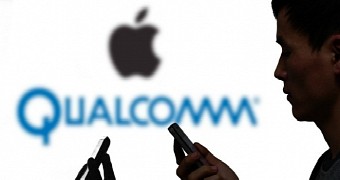According to the Fuzhou Intermediate People’s Court in China, Qualcomm's patents regarding app management and resizing photographs on a touchscreen were infringed upon by Apple.
Moreover, the Chinese court granted Qualcomm two preliminary injunctions against Chinese Apple subsidiaries "ordering them to immediately cease infringing upon two Qualcomm patents through the unlicensed importation, sale and offers for sale in China of the iPhone 6S, iPhone 6S Plus, iPhone 7, iPhone 7 Plus, iPhone 8, iPhone 8 Plus and iPhone X."
The two patents Apple was found to be in breach of by Fuzhou Intermediate People’s Court were previously found to be valid by the Chinese patent office (SIPO) as detailed by Qualcomm in their press release.
Qualcomm also stated that the software patents Apple was found to be infringing by the Chinese Court are designed to help users reformat and change the appearance and size of photographs, as well as to manage apps when navigating between and dismissing applications.
“Apple continues to benefit from our intellectual property while refusing to compensate us. These Court orders are further confirmation of the strength of Qualcomm’s vast patent portfolio,” said Don Rosenberg, executive vice president and general counsel, Qualcomm Incorporated
Qualcomm and Apple have been battling in a law court for the past few years
The legal battle between Apple and Qualcomm runs very deep given that they've been suing each other on various counts and in multiple courts for the past few years.
For example, in May 2017 Qualcomm reportedly asked the U.S. Trade Commission to implement a trade ban on all imports of iPhones into the states, while in July 2017 it went on to request a ban on all iOS devices using a 4G wireless modem from Intel.
Apple previously filed a $1 billion lawsuit against Qualcomm in January 2017 saying that it allegedly charged five times more in payments excessive royalties than any other patent licensors “for technologies they have nothing to do with.”
During September 2018 Qualcomm eventually ended up countersuing Apple suggesting that Cupertino helped Intel create more competitive chips with the help of stolen Qualcomm trade secrets.
Qualcomm concluded the press release adding that "Additional actions seeking similar relief for Apple’s infringement of other Qualcomm patents are pending in China and other jurisdictions around the world."

 14 DAY TRIAL //
14 DAY TRIAL //